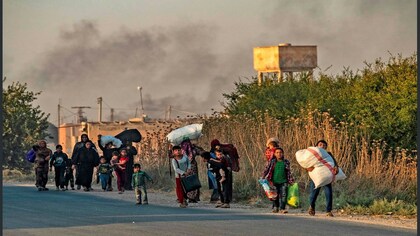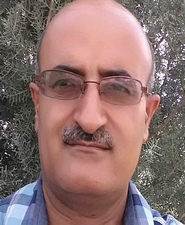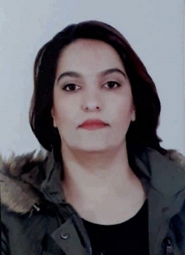Rivalry over Syria, Iraq widens rift between Turkey and Iran
21:17 - 18 December 2011

While an entire swath of the Arab world is in upheaval in one form or another, two non-Arab nations, Iran and Turkey, are in fierce competition to redefine their leadership roles in the Middle East, further stoking concerns that unrest sweeping the region may risk inciting wider, potentially devastating conflicts.
Following a day-long meeting on Thursday, the top Turkish military council said it reviewed the military\'s preparedness for war, without elaborating on what types of threats the country faces. Observers immediately jumped to the conclusion that it was a message designed to send chills through Tehran and its chief ally Syria.
The statement came shortly after a series of threats Iranian officials made against Turkey, although Iran denied they were the Islamic republic\'s official position. The largely hidden \"cold war\" between Tehran and Ankara is brewing quickly, bringing with it a greater risk of conflict.
The great indulgence granted to Iran\'s ways and phobias in the face of a nuclear standoff last year between the Islamic republic and the West has reaped a self-destructing harvest, giving leeway to Iran\'s never-ceasing desire to expand. It would have been unimaginable last year, following Turkey\'s defense of the Islamic republic to defuse Western threats, to now expect Iran to end its friendship with the NATO member.
The current split between Turkey and Iran began with the installment of NATO\'s early-warning radar system in Turkey and widened as the uprising in Syria looked to oust the leader of Iran\'s chief ally.
Turkish diplomats tossed back and forth the question of whether Iran is a reliable partner, and there was a deep fissure among Turkish intellectuals over Iran’s role in Turkey’s foreign policy decisions. Turkey and Iran have always had trouble describing how they relate to each other. While Turkey was protecting Iran from a growing Western confrontation last year, its policy was calculated to maintain stability in the region, advancing trade and friendly relations. The current upheaval in the Middle East has thrown the Turkish government’s much-vaunted zero-problems foreign policy into disarray and spawned a new era of rivalry between Iran and Turkey over Arab lands.
Turkey is still the Middle East’s largest power and may be a little smarter, having learned from the bitter lessons the Arab Spring taught. Navigating in a region of constant instability and falling dictators brings new opportunities for influence as well as confrontations with rival nations.
Iranians sent several subtle indicators of their mounting unease at Turkey’s announced intention to host NATO’s early-warning radar system. The several threats Iranian officials made this week were the latest bust-ups between Ankara and Tehran in the past few months. In a sign of Iran’s growing frustration, Hussein Ibrahim, the vice president of the Iranian parliamentary national security and foreign policy panel, reportedly said in an interview with the Iranian daily Shargh last Sunday that it is Iran’s natural right to target the missile defense shield system in Turkey in case of an attack, and “we will definitely resort to that.”
Turkey has pointedly ramped up its public warnings over the last few weeks about Iran’s threats, accompanied by private warnings to Iran delivered by Turkish Foreign Minister Ahmet Davutoğlu to his Iranian counterpart, Ali Akbar Salehi.
Turkish diplomats told Today’s Zaman that the Iranian foreign ministry had assured Turkey they do not back such threats and the threats do not reflect ministerial policy. The officials also repeated Ankara’s position that Turkey should only acknowledge statements from Iranian officials actually in charge, including the Iranian president and the foreign ministry.
Davutoğlu himself called Salehi earlier this week, demanding an explanation. Salehi reiterated that these remarks don’t reflect official Iranian position.
Salehi’s statement may also signal deepening cracks in Iran’s ruling establishment as it becomes increasingly difficult for the Iranian government to contain hardline elements. “The fractured nature of Iran’s own political system often leads to schizophrenic responses to regional and global events,” said Aaron Stein, a foreign policy analyst and nonproliferation specialist based in Turkey, while assessing different remarks from Iranian officials. Yet what most agree on is that the constant threats Iran makes have now reached a critical juncture.
“Clashes of interest, ideas are wide and deep ,” said Walter Russell Mead, editor-at-large of the American Interest magazine.
Turkey seeks influence in Iraq, Iran unhappy
Turkey also faces an uphill struggle in Iraq, where it lost some leverage during the government-formation process last year as the Turkish foreign minister campaigned for a constitutional-amendment referendum instead of dealing with political issues in Iraq.
Iraq’s current leadership, seen as Iran’s poodle, is unhappy with Turkey’s role in Iraqi politics and instead welcomes Iran’s growing interference in its own internal affairs.
In a recent interview with the Wall Street Journal (WSJ), Iraqi Prime Minister Nouri al-Maliki said Iraq welcomes Turks on the economic cooperation front, “but we do not welcome interference in political matters.”
He alleged that Turkey interferes by backing certain political figures and blocs. “We have continuously objected to their previous ambassador’s interferences, and they have admitted this interference. In political matters, they have unacceptably interfered,” Maliki told the WSJ.
On Iran, he was upbeat. He said Iranians have had some good positions and influence at certain junctures in Iraq and today, it should be more positive as the US prepares for complete drawdown from Iraq by the end of the year.
Mead said Turkish success in Iraq would lead to a less pro-Iranian coalition in Baghdad, referring to Turkey’s rivalry over the country.
Mead connected any Turkish success in the Middle East as equal to Iran’s failure. He said ideologically, Turkey hopes to lead the Sunni Islam world while Iran aspires to lead the entire Islamic world. He also added that the same thing could be applied to Syria where Turkey’s success there could be spelled as Iran’s failure as well as loss of Iranian ties to Hamas.
Who is loser in Arab Spring, Iran or Turkey?
There is also a growing understanding that Iran’s bravado against Turkey masks some obvious worries about it being an overall loser in the Arab Spring. But Iran and Turkey have put a positive spin on the Arab Spring with the Islamic republic saying it will spell the end of US-backed governments and the other claiming it to be a “normalization of history.”
Stein says the relationship between Turkey and Iran started to deteriorate when Turkey was publicly rebuked by the West for its role in the nuclear swap deal last year and the Iranians showed little gratitude for the Turkish efforts.
“When you combine this with the fact that despite the Turkish expectation, the Iranian market remains, by and large, closed to Turkish exports, the roots of rivalry were re-planted,” he claims, adding that the chaos in Syria exacerbated this budding tension and Turkey’s outright support for the Western-backed calls for regime change thrust these low-lying tensions into the public.
He noted that although actors from both sides are squabbling, there is little chance that tensions will boil over, and the two governments will continue to cooperate and compete when it’s called for.
He added that the Iranians and the Turks are permanent entities in the region, and they will have to find a way to cooperate or risk greater damage to their strategic interests.
Ali-Akbar Velayati, senior adviser to Iran’s supreme leader Ayatollah Ali Khamenei, said last week Turkey’s model of “secular Islam” is a version of western liberal democracy and unacceptable for countries going through what he said an “Islamic awakening.”
Veysel Ayhan, an expert from the Center for Middle Eastern Strategic Studies (ORSAM), said Velayati’s remarks show that Iran can’t see the realities of the region. He added that former authoritarian regimes were suppressing political parties and movements that had Islamic elements, and that marrying Islam, democracy and secular institutions is what Turkey has been successful at. While Iran wants to export theocratic regimes, he said, in contrast, Turkey’s secular political institutions which also maintain Islamic sensitivities are what Arab nations want.
According to Ayhan, the radicalization of Islamic parties are a danger post-revolution Arab countries face but building Turkish-like political institutions would ensure a successful transition.
Source – Sunday \'s Zaman
Following a day-long meeting on Thursday, the top Turkish military council said it reviewed the military\'s preparedness for war, without elaborating on what types of threats the country faces. Observers immediately jumped to the conclusion that it was a message designed to send chills through Tehran and its chief ally Syria.
The statement came shortly after a series of threats Iranian officials made against Turkey, although Iran denied they were the Islamic republic\'s official position. The largely hidden \"cold war\" between Tehran and Ankara is brewing quickly, bringing with it a greater risk of conflict.
The great indulgence granted to Iran\'s ways and phobias in the face of a nuclear standoff last year between the Islamic republic and the West has reaped a self-destructing harvest, giving leeway to Iran\'s never-ceasing desire to expand. It would have been unimaginable last year, following Turkey\'s defense of the Islamic republic to defuse Western threats, to now expect Iran to end its friendship with the NATO member.
The current split between Turkey and Iran began with the installment of NATO\'s early-warning radar system in Turkey and widened as the uprising in Syria looked to oust the leader of Iran\'s chief ally.
Turkish diplomats tossed back and forth the question of whether Iran is a reliable partner, and there was a deep fissure among Turkish intellectuals over Iran’s role in Turkey’s foreign policy decisions. Turkey and Iran have always had trouble describing how they relate to each other. While Turkey was protecting Iran from a growing Western confrontation last year, its policy was calculated to maintain stability in the region, advancing trade and friendly relations. The current upheaval in the Middle East has thrown the Turkish government’s much-vaunted zero-problems foreign policy into disarray and spawned a new era of rivalry between Iran and Turkey over Arab lands.
Turkey is still the Middle East’s largest power and may be a little smarter, having learned from the bitter lessons the Arab Spring taught. Navigating in a region of constant instability and falling dictators brings new opportunities for influence as well as confrontations with rival nations.
Iranians sent several subtle indicators of their mounting unease at Turkey’s announced intention to host NATO’s early-warning radar system. The several threats Iranian officials made this week were the latest bust-ups between Ankara and Tehran in the past few months. In a sign of Iran’s growing frustration, Hussein Ibrahim, the vice president of the Iranian parliamentary national security and foreign policy panel, reportedly said in an interview with the Iranian daily Shargh last Sunday that it is Iran’s natural right to target the missile defense shield system in Turkey in case of an attack, and “we will definitely resort to that.”
Turkey has pointedly ramped up its public warnings over the last few weeks about Iran’s threats, accompanied by private warnings to Iran delivered by Turkish Foreign Minister Ahmet Davutoğlu to his Iranian counterpart, Ali Akbar Salehi.
Turkish diplomats told Today’s Zaman that the Iranian foreign ministry had assured Turkey they do not back such threats and the threats do not reflect ministerial policy. The officials also repeated Ankara’s position that Turkey should only acknowledge statements from Iranian officials actually in charge, including the Iranian president and the foreign ministry.
Davutoğlu himself called Salehi earlier this week, demanding an explanation. Salehi reiterated that these remarks don’t reflect official Iranian position.
Salehi’s statement may also signal deepening cracks in Iran’s ruling establishment as it becomes increasingly difficult for the Iranian government to contain hardline elements. “The fractured nature of Iran’s own political system often leads to schizophrenic responses to regional and global events,” said Aaron Stein, a foreign policy analyst and nonproliferation specialist based in Turkey, while assessing different remarks from Iranian officials. Yet what most agree on is that the constant threats Iran makes have now reached a critical juncture.
“Clashes of interest, ideas are wide and deep ,” said Walter Russell Mead, editor-at-large of the American Interest magazine.
Turkey seeks influence in Iraq, Iran unhappy
Turkey also faces an uphill struggle in Iraq, where it lost some leverage during the government-formation process last year as the Turkish foreign minister campaigned for a constitutional-amendment referendum instead of dealing with political issues in Iraq.
Iraq’s current leadership, seen as Iran’s poodle, is unhappy with Turkey’s role in Iraqi politics and instead welcomes Iran’s growing interference in its own internal affairs.
In a recent interview with the Wall Street Journal (WSJ), Iraqi Prime Minister Nouri al-Maliki said Iraq welcomes Turks on the economic cooperation front, “but we do not welcome interference in political matters.”
He alleged that Turkey interferes by backing certain political figures and blocs. “We have continuously objected to their previous ambassador’s interferences, and they have admitted this interference. In political matters, they have unacceptably interfered,” Maliki told the WSJ.
On Iran, he was upbeat. He said Iranians have had some good positions and influence at certain junctures in Iraq and today, it should be more positive as the US prepares for complete drawdown from Iraq by the end of the year.
Mead said Turkish success in Iraq would lead to a less pro-Iranian coalition in Baghdad, referring to Turkey’s rivalry over the country.
Mead connected any Turkish success in the Middle East as equal to Iran’s failure. He said ideologically, Turkey hopes to lead the Sunni Islam world while Iran aspires to lead the entire Islamic world. He also added that the same thing could be applied to Syria where Turkey’s success there could be spelled as Iran’s failure as well as loss of Iranian ties to Hamas.
Who is loser in Arab Spring, Iran or Turkey?
There is also a growing understanding that Iran’s bravado against Turkey masks some obvious worries about it being an overall loser in the Arab Spring. But Iran and Turkey have put a positive spin on the Arab Spring with the Islamic republic saying it will spell the end of US-backed governments and the other claiming it to be a “normalization of history.”
Stein says the relationship between Turkey and Iran started to deteriorate when Turkey was publicly rebuked by the West for its role in the nuclear swap deal last year and the Iranians showed little gratitude for the Turkish efforts.
“When you combine this with the fact that despite the Turkish expectation, the Iranian market remains, by and large, closed to Turkish exports, the roots of rivalry were re-planted,” he claims, adding that the chaos in Syria exacerbated this budding tension and Turkey’s outright support for the Western-backed calls for regime change thrust these low-lying tensions into the public.
He noted that although actors from both sides are squabbling, there is little chance that tensions will boil over, and the two governments will continue to cooperate and compete when it’s called for.
He added that the Iranians and the Turks are permanent entities in the region, and they will have to find a way to cooperate or risk greater damage to their strategic interests.
Ali-Akbar Velayati, senior adviser to Iran’s supreme leader Ayatollah Ali Khamenei, said last week Turkey’s model of “secular Islam” is a version of western liberal democracy and unacceptable for countries going through what he said an “Islamic awakening.”
Veysel Ayhan, an expert from the Center for Middle Eastern Strategic Studies (ORSAM), said Velayati’s remarks show that Iran can’t see the realities of the region. He added that former authoritarian regimes were suppressing political parties and movements that had Islamic elements, and that marrying Islam, democracy and secular institutions is what Turkey has been successful at. While Iran wants to export theocratic regimes, he said, in contrast, Turkey’s secular political institutions which also maintain Islamic sensitivities are what Arab nations want.
According to Ayhan, the radicalization of Islamic parties are a danger post-revolution Arab countries face but building Turkish-like political institutions would ensure a successful transition.
Source – Sunday \'s Zaman



